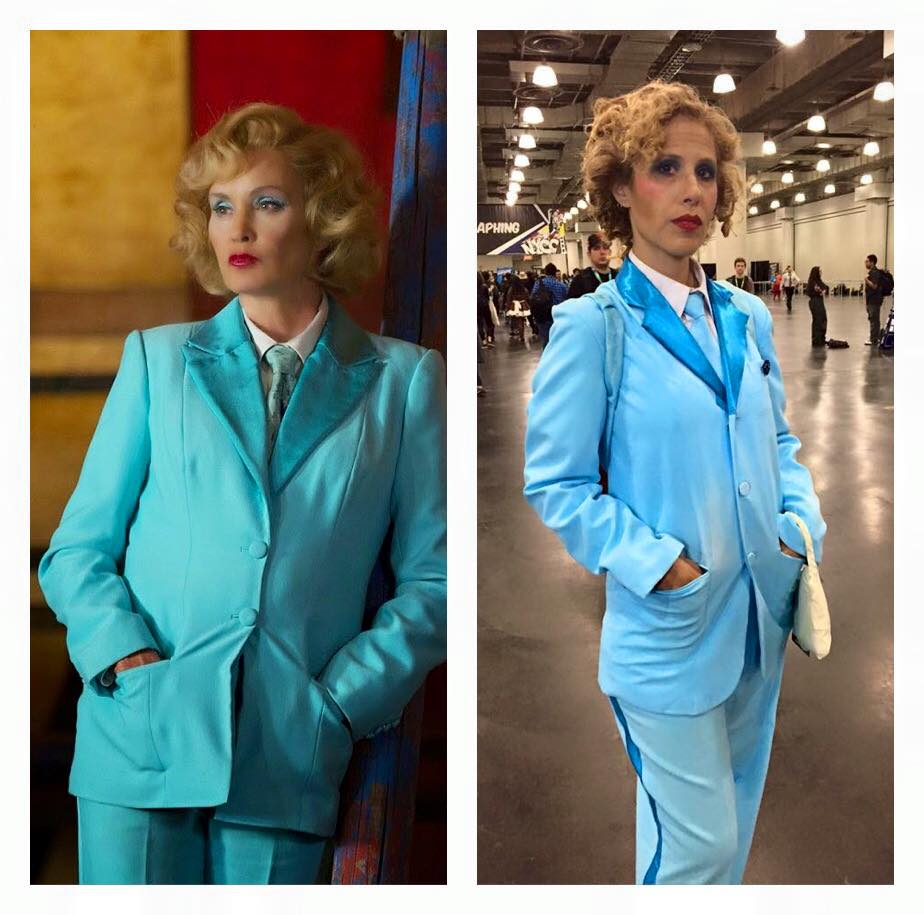Elsa Mars isn’t a villain…except when she is.
American Horror Story: Freak Show was my other favourite season. Who am I kidding? For me, that show was two seasons long, and they were this one and Asylum. Much as I love Freak Show, it had more than its share of flaws and a lot of those had to do with Jessica Lange’s character, the manager and star of the eponymous freak show. It wasn’t Lange’s fault, and for once, I’m not going to blame most of the problems of the show on showrunner Ryan Murphy. The show’s problem in general, and Elsa’s in particular, was the old chestnut of “too many cooks”. This season, in particular, had a lot of different writers with different agendas, and it showed.
Elsa Mars emigrated to America from Germany after WWII. The decadence of the Weimar Republic was good to her, until it wasn’t. The life of a cabaret singer/dancer wasn’t lucrative or prestigious enough for Elsa, with her big dreams of stardom. She carved out a niche for herself in the dark underbelly of Berlin, working as a successful dominatrix. As an actress, she discovered she was good at that kind of thing, and let’s face it—acclaim is acclaim. This went well until the shadowy characters who had been filming her sessions decided to switch from S&M porn to snuff films.
Elsa was drugged and tied to a bed. They used a chainsaw, cutting off both her legs just below the knee, and left her to die. She was saved by a client with a crush on her who whisked her off to a master artisan, who built her the best pair of prosthetic legs ever seen in 1932. She learned to walk again, the scars didn’t show on the outside, and she headed to America to make her fortune. Though she did her best to never look back, the snuff film remained as evidence of her humiliation, and how low she had allowed herself to fall. Later, the film would resurface and seek to destroy her life all over again.
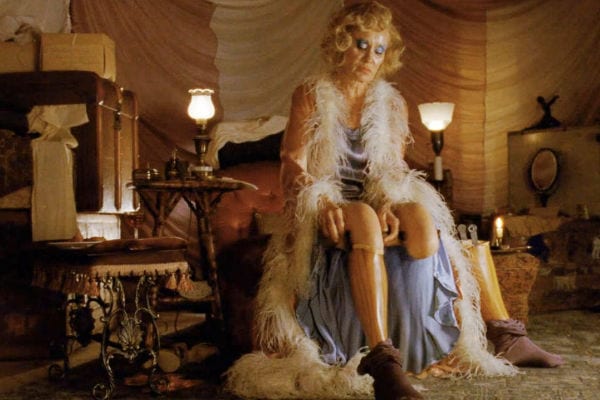
America didn’t roll out the red carpet for Elsa Mars the way she had expected it would. It’s hard to get an exact age on her at any given time, because the makeup department was ridiculously adept at making J-Lange look as young or as old as they wanted to. Starting out as a chorus girl in a traveling show, she didn’t feel right among the dancers (they didn’t know about her lack of real legs) and decided she needed her own show, that she would run. She had never liked the treatment of the so-called “freaks” in the sideshow acts, and she realised what her calling must be.
Here’s the problem with Elsa Mars. I don’t think any of the many writers on the season saw her the same way. Some push the villain angle REALLY hard. And, honestly, it’s the easiest way to see her. While she genuinely loves the “monsters” in her care, has spent years travelling around to orphanages and the like rescuing these unfortunates, ultimately she is out for number one. Her need for stardom trumps everything else and she does some horrible things while trying to get there. I would never say otherwise. Remember me, though? I’m the guy who wrote a whole big thing showing sympathy for Cersei Lannister.
Here’s my thing with Elsa Mars (and with Cersei, for that matter). I find her more tragic than anything else. And she’s complicated. Human beings are, and TV characters should be. I would love to see a series on Elsa Mars, the early years, when she was a budding starlet with medium talent and killer legs. She wasn’t good enough to break out of the minor leagues as a legit performer. How long did she pound the pavements of Berlin before settling for sex work (nothing wrong with sex work when it’s your choice, but she had a dream and that dream didn’t involve whips and ball gags)? I know from experience that the life of an aspiring performer can grind you down, no matter how young, scrappy and hungry you are when you start out.
By the time we meet Elsa Mars she’s no longer young, fame remains elusive, and time is running out. Her illusion of herself as a big Hollywood star isn’t ego—or at least, it isn’t only ego. It’s a mythology she’s built about herself over the years, out of desperation. It’s armour. And yes, she believes her own bullshit. But like almost any performer, Elsa’s ego is a crystal palace. It’s enormous and very, very fragile. One stone thrown, in the form of a cutting remark, or lack of applause and the palace crumbles.
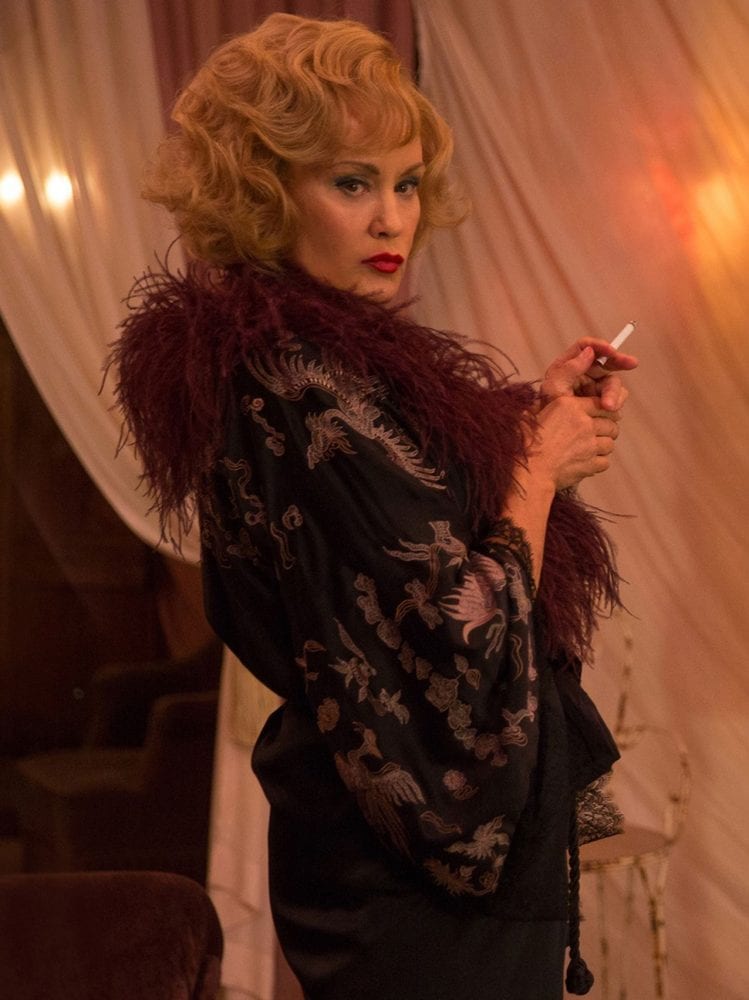
It’s not like Elsa can’t humble herself when she has to. In the very first episode, we see her cutting a deal with the landlord so the struggling freakshow won’t get evicted. First, she gives up her fancy lingerie, and then she gives up herself. She doesn’t tell anyone she’s made these demeaning sacrifices, she just gets it done. A word often used to describe Elsa Mars is “desperate”, and it’s true. She built her own life out of desperation, because she is shut out of everywhere else. She self-medicates with liquor and opiates, and plays the grand dame for her company because she is even set apart from them. Even in her own family, she is an other—a freak among freaks—because she feels that she doesn’t truly belong there.
I believe that Ryan Murphy, at least, saw Elsa the way I see her. She wants to be loved, but she is pitied. The other writers? Crazy bitch. Even when given straight-up villain material to work with (or questionable Murphy dialogue), however, Jessica Lange knows her craft. She makes sure you see the real person in there, even when the writers make it difficult. Also, let’s be real—she’s got amazing dialect coaches (between this and Asylum? Please). And like I said, the help and support she has given her people over the years is real.
Bearded Lady Ethel Darling (Kathy Bates) says of her best friend, “She rescues the wretched and unloved and gives them a home.” And it’s true. The Tattler twins (Sarah Paulson), Pepper (Naomi Grossman), even Barbara (Chrissy Metz)—Elsa Mars genuinely saved them from awful lives, and made them family. Elsa loves the image of herself as a benevolent savior. But pushed deep under that, Elsa knows that her motives are corrupt, that she would drop all her children in a second if Hollywood were to finally beckon. She knows this, and it eats her up with guilt, which she treats with liquor, opiates, and denial.

When the otherworldly Edward Mordrake (Wes Bentley) is drawn to the camp on Halloween because Elsa dares break the tradition that says freaks never perform on that night, he and his ghostly henchmen consider Elsa as potential for the dark soul they will take back with them. For the second time in her life, she is held down on a bed and has her legs (the fake ones) torn from her by strangers. She pours out her pain to him, begs him to take her with him—but no. He doesn’t want her either. It’s just another example of Elsa being shut out of where she wants to be.
As shrewd as she may be, Elsa Mars is an easy mark for the clever and unscrupulous. When the team of grifters Maggie and Stanley (Emma Roberts and Denis O’Hare) discover there is a fortune to be made from the corpses of those in the freakshow they weasel their way into the camp. They get Elsa’s number very quickly, and they play her like a $2 banjo. Stanley presents himself as a television agent, claiming he can make her a star. Initially, she scorns the idea of television. However, once she suffers the slings and arrows of an abusive audience that I always wonder if Stanley paid off to have boo at her, the smaller screen begins to look pretty good. It’s where we first begin to see her real hypocrisy, how she is ready to throw over her freaks for the chance of the real career she’s always wanted.
We’re not sure for how long Paul (Mat Fraser) has been Elsa’s lover, but he’s close enough to have a different perspective of their boss-lady than many. When Jimmy Darling (Evan Peters) defends Elsa, despite her dark heart, Paul drops a truth bomb on Lobster Boy. “From your position, Elsa looks like our guardian angel. But from where I’m sitting, I see a jealous broad near the end of the line who’d kill anyone or anything that got in the way of her one last shot at it.”
Paul isn’t afraid to speak truth to power, not even when, in what almost seems a fugue state of tantrum and rage, Elsa straps him to a big wheel and throws knives at his spinning body. The fugue bubble pops when she actually hurts him, and she’s distraught—but really, it’s more theatre. She’s jealous because she knows Paul has fallen in love with someone else, so she doesn’t really give a damn if he dies. She had told him all along not to fall in love with her (assuming he would do just that), but then becomes the proverbial woman scorned, and hell hath no fury.
One of my favourite friendships in the series is Elsa and Ethel’s. Elsa, on the surface, is everything that Ethel isn’t. Elsa is beautiful and glamourous, and a leader, while Ethel has spent most of her life being handled (often harshly) by a more dominant personality. When they met, Elsa must have seemed like an angel to Ethel. And Ethel is the closest thing Elsa has to a real friend. Don’t get me wrong, Elsa’s narcissism doesn’t allow for much in the way of healthy relationships. But it is to Ethel that Elsa is able to show her vulnerable side, if only for a moment here or there.
It is to Ethel that Elsa confesses her true motive for bringing in the Tattler twins—they would be the draw, but her hope is that she herself would be discovered. “Is it too late for me? Is it wrong?” And like always, Ethel soothes and enables her friend at the same time. I’m pretty sure Ethel, who is no dummy, knows deep down exactly what Elsa is but chooses to overlook it because she so strongly believes in the good that is also there.
Even Ethel has a threshold where Elsa Mars is concerned. Ethel is fine with Elsa’s birthday celebrations lasting a whole week, or with Elsa cancelling Christmas because she can. She has no problem with Elsa sitting there like a queen, receiving gifts and compliments and letting them all worship her. I think she enjoys basking in the light of Elsa’s happiness, because when Elsa is happy the whole room lights up. That’s her star quality, and it is real. But when the Tattler sisters disappear and suspicion falls on Elsa, for all that Ethel defends her surrogate sister to everyone else, her private words to Elsa are of a different nature. “If I ever found out you were lying or did wrong by those girls, I’ll kill you with my own two hands.”
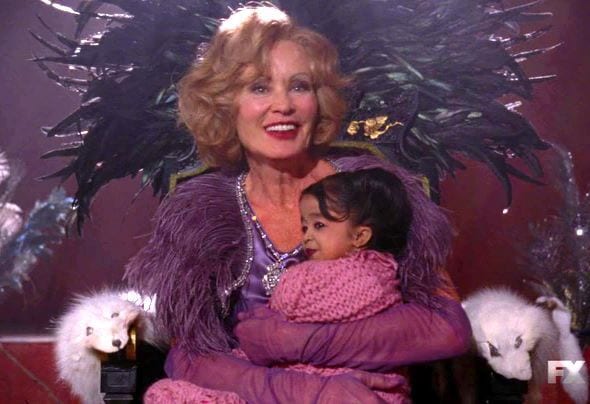
What finally brings Elsa and Ethel’s friendship to its knees is the death of little Ma Petite (Jyoti Amge). She’s been murdered by Dell (Michael Chiklis), but fingers are being pointed elsewhere. Ryan Murphy wrote this episode himself, and for once I’m glad for a Murphy-penned episode, because I think anyone else would have been quick to paint Elsa with the bad-guy brush, and leave out the nuance. Both Ethel and Elsa are drunk and grieving. Both deeply loved Ma Petite. Stanley, the real culprit (he made Dell kill her) had a conversation with Elsa which, overheard by Ethel, was just enough to make Ethel think her friend had done the unforgivable.
I don’t think that even at her delusional worst, Elsa could have hurt Ma Petite, but who knows. Anyway, both are drunk, and each accuses the other of the worst thing possible. Ethel can’t live with the idea that Elsa killed Ma Petite, and when confronted, Elsa can’t forgive her friend for even entertaining the notion of Elsa as a murderer. It’s textbook narcissist behavior. When accused, Elsa plays the wounded animal, and turns it around so that she is the real victim. And in fairness, I would be furious too if, amidst all the awful things I’ve done, the thing my best friend decides to accuse me of is the one thing I know I didn’t do—the one thing that hurts me as much as it does everyone else.
I think Ethel knows on some level that accusing Elsa Mars means her own death sentence. She tells Elsa that once she’s dead, Ethel plans to kill the rest of the freaks. I don’t think that’s true. It’s not in Ethel’s nature. I don’t think Ethel would have harmed any of the rest of them, but it’s all Elsa needs to hear to validate her whole line of protecting them. Ethel gives Elsa an excuse to kill her, possibly because Ethel’s heart is broken and she doesn’t want to go on, continuing to watch her family fall apart.
I can’t leave without giving special mention to E10, “Orphans”. James Wong wrote it, which never fails to impress me since he’s not normally one of their usual crew whose work I like. “Orphans” is where we get the real backstory of the Elsa/Pepper relationship, and it is just beautiful. Elsa rescued the microcephalic Pepper from an orphanage where the pinhead had lived in depressive squalor til the age of 18. Her own family had given up on her, but Elsa saw a real person in Pepper, not just a freak. Elsa patiently taught Pepper, found her a mate, even a child substitute in Ma Petite. No, I will never claim that Elsa’s motives are entirely pure, or that her love and support is permanent.
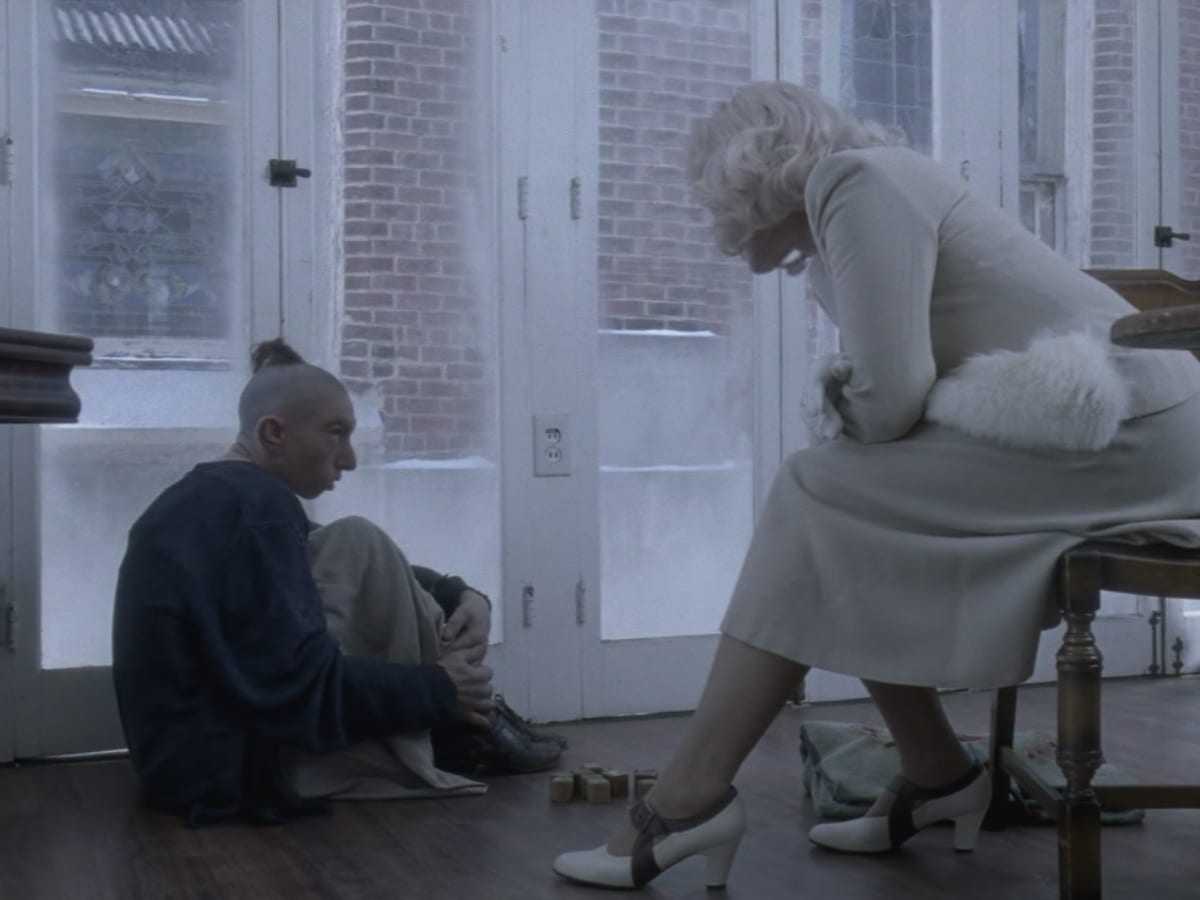
Pepper may have been Elsa’s first freak, her first love, but when Pepper proves difficult after the death of her “spouse”, Elsa decides she needs to find Pepper another home. Also, Elsa thinks she is off to a bright future in Hollywood, and she can’t bring a pinhead with her. She tracks down Pepper’s sister Rita, hoping that actual family will be able to love Pepper the way she herself does. It’s not a realistic hope, because if Pepper’s blood family had given a damn about her, they would have shown it by now. For the second time, Pepper is abandoned. In fairness, Elsa does do her best to persuade Rita to give Pepper a chance, that she will learn to love Pepper too. And Elsa’s tears as she walks away are real. But still, she walks away.
I’ll say it again. Elsa did save every one of them, from lives of probable loneliness and squalor. She gives Jimmy tough love when he needs it, and hunts down Massimo to make Jimmy new hands after he loses his own to Dell’s treachery. She protects the freaks, as far as her narcissism will allow, and will go absolute avenging angel on anyone who tries to harm them. Stanley, one of the few unambiguous bad guys of the piece (it’s what made the show work, that most of the characters are complicated and hardly anyone is a straight-up villain), is given the full-on Tod Browning treatment as punishment for what he did to them. Dell, for whom we do get a moment or two of sympathy, is unceremoniously executed by Elsa without a second thought, once she hears him confess to killing Ma Petite.
To Stanley, she says “You tried to kill my dreams, but they cannot be murdered. But you brought death into this place, and for that you must pay.” Revenge on Stanley reunites the camp for a moment, but then they figure out how Ethel died, and Elsa is the villain once again. And the one thing for which Elsa cannot forgive her monsters is their fitting her with a black hat. Even though the terrible things she’s done are all true, it’s also true that she saved them all. And the problem is, she believes that validates anything else she does. When Elsa says “I just want to be loved,” it’s true, but not even she knows the insane depths her desperation for love and adulation will drive her to.
It’s definitely a betrayal of her family when Elsa sells the show to first to Chester (Neil Patrick Harris) and then to Dandy Mott (Finn Wittrock, and another unambiguous bad guy). Elsa doesn’t know that Chester is mentally unstable, or that Dandy is a murderer and a psychopath. All she knows is that Dandy is a spoiled rich kid, and he probably sold her a good line about how he would look after everyone, and she believed it because she wanted to. And she’s still hurting from their betrayal of her, so by selling the show, she can cut the last tie and move on.
It’s a shame that she can’t find happiness with Massimo, since he has come to help Jimmy, but even though he loves her, he is a broken man, dying, and knows he isn’t her destiny. Certainly he was closer to her heart than any of the others, but who knows if she actually could have loved him. I don’t think so. Eventually he wouldn’t have been enough for her either.
Ryan Murphy didn’t write the finale, but I have this headcanon where he marched back in and said I created this show and this is how you will play with my toys. Even though John Gray wrote it (and I wish they had gotten Tim Minear—Gray gets the job done, but he’s not in Minear’s league), you really feel Ryan Murphy’s influence, particularly where the conclusion of Elsa’s story arc is concerned. I feel like half the writers on the series would have been happy to have her go out a bad guy, but it was Jessica Lange’s swan song on the show (at least for the moment), and Murphy wasn’t having it.
That last episode could have been a series all on its own. Elsa has finally gotten to Hollywood, and thanks to persistence and luck, she’s become the Queen of Friday Night. The Elsa Mars Hour is a resounding success, and she’s got all the fame she ever asked for. Not that getting there was easy either—she’s stuck in a loveless marriage with manager Michael Beck (David Burtka), who not only wants to live off Elsa the star, he wants to be disciplined by Mistress Elsa. It can’t have been easy for her to revisit that time in her life, or the memory of the pain and humiliation it brought her.
It’s that past that eventually brings down her present. Not that she’s satisfied, of course. She has what she’s always wanted, doing terrible things to get there, and is now bored and dissatisfied. She had always thought fame would equal love, but it doesn’t. And like the narcissist she is, she manages to feel like the victim there too. “I have away been cursed, first by having my dreams ripped away, and now by having them come true.” That’s real talent—making us feel sorry for someone who’s gotten everything she’s always wanted.

Everyone spent the entire season complaining about television, even Elsa, so when she winds up a star of it, it is another betrayal to her own kind. And all those years she scorned the smaller screen, it never occurred to her that that big an audience would come with conditions. Those films she did back in Berlin suddenly resurface, and wouldn’t you know it, Elsa Mars has got a morals clause in her contract. It’s poetic justice, really, since way back in the beginning of the series, she used pornographic films of Penny (Grace Gummer) as a way to blackmail Penny into silence about the freak show.
Now it’s Elsa’s own films that ruin her, to say nothing of her connection to something as seedy as a freak show. This all comes out as she is refusing to do a Halloween show, because freaks don’t do that—and this is how she learns of the deaths of most of the family she left back in Florida. She doesn’t know the details of Dandy’s killing spree, but it’s all she needs to come to terms with the fact that her time is done. “Might as well go out with a bang”. She agrees to the Halloween show, daring Edward Mordrake to come for her. He doesn’t disappoint.
Now that all her freaks, her real family, are gone, I think she feels badly about denying them for so long, so going out this way is an homage. The surviving members of the freak show see her on television, and even they seem to feel that it’s right. The number she sings is David Bowie’s “Heroes”, and it is a study in defiance, regret, and surrender. No one in the television audience sees Mordrake, but Elsa does. Once more, she says “I am the biggest freak of all”, and then she falls.
The very last bit can only be described as a Titanic ending (or, again, Murphy getting in there and demonstrating how people should be playing with his toys). Elsa fully expects the afterlife to be something terrible. Instead, she’s back at the freak show, with all her friends, a full house, and everyone loving her as much as she ever wanted them to do. I sometimes wonder if I, Claudius was a bit of inspiration for Elsa and her motives. Livia tells Claudius that she needs to be made a goddess when she dies, because gods don’t have to go to Hell, no matter what they’ve done. When Elsa asks Ethel, “don’t I have to pay for my sins?” it’s nice to hear her at least acknowledge that she’s actually sinned. And Ethel rationalizes the whole thing to her. It’s all right, she says. You were just playing a part. We understand.
Is this good writing? Probably not. Do I give a damn? No way. I, like Ryan Murphy, wanted Elsa Mars and Jessica Lange to go out with a bang. I wanted her complexity celebrated, and yes, I wanted her to have whatever happy ending was possible for someone like her, whether she deserved it or not.
